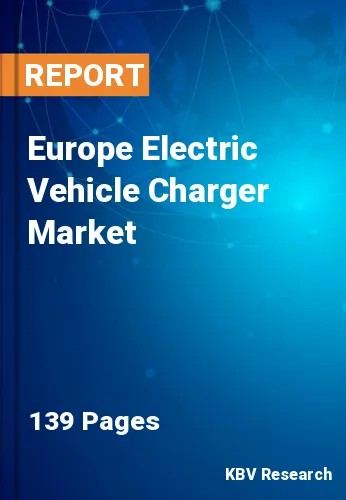The Europe Electric Vehicle Charger Market would witness market growth of 27.5% CAGR during the forecast period (2023-2030).
The market is versatile, catering to various applications across different sectors. These applications encompass residential, commercial, and public charging infrastructure, each playing a crucial role in the widespread adoption of electric vehicles. Residential charging solutions are designed to offer EV owners the convenience of charging their vehicles at home. These chargers are typically installed in garages or driveways, providing a reliable and accessible power source. Residential chargers offer EV owners the choice between slow or fast charging, making them conveniently prepared for their daily commute. The affordable and easy installation of residential chargers has made them popular for EV owners. Furthermore, incentives and rebates in many regions encourage homeowners to install EV chargers, bolstering the residential charging demand.
Commercial charging infrastructure caters to businesses and organizations seeking to electrify vehicle fleets. This application is particularly significant for industries with substantial transportation needs, such as logistics, delivery services, and public transportation. Fleet operators increasingly acknowledge the potential cost savings and environmental advantages of adopting electric vehicles. Numerous businesses are implementing electric vehicle charging infrastructure at their premises to promote and facilitate the use of electric vehicles among their employees. Providing workplace charging not only demonstrates a commitment to sustainability but also helps attract and retain eco-conscious talent.
The UK government has implemented various measures to encourage EV adoption, such as grants for purchasing EVs, tax incentives, and installing charging infrastructure. For instance, the Plug-In Car Grant provides financial support to individuals purchasing new electric vehicles, making EVs more affordable for consumers. As per the International Trade Administration, in 2021, the Government set aside 12 billion pounds (USD 16 billion) to aid in multi-sector efforts to reduce carbon emissions. According to the government, this plan will allow the private sector to contribute up to three times that amount. For those purchasing zero or ultra-low-emission vehicles, the plan specifically offers $776 million in grants to make them more affordable.
The Germany market dominated the Europe Electric Vehicle Charger Market by Country in 2022, and would continue to be a dominant market till 2030; thereby, achieving a market value of $3,123.8 Million by 2030. The UK market is experiencing a CAGR of 26.3% during (2023 - 2030). Additionally, The France market would exhibit a CAGR of 28.6% during (2023 - 2030).
Based on End User, the market is segmented into Residential and Commercial. Based on Vehicle Type, the market is segmented into Plug-in Hybrid Electric Vehicle (PHEV), Battery Electric Vehicle (BEV) and Hybrid Electric Vehicle (HEV). Based on Charging Type, the market is segmented into On-board Chargers and Off-board Chargers. Based on countries, the market is segmented into Germany, UK, France, Russia, Norway, Netherlands, and Rest of Europe.
Free Valuable Insights: The Global Electric Vehicle Charger Market will Hit $53.1 Billion by 2030, at a CAGR of 28.6%
The market research report covers the analysis of key stake holders of the market. Key companies profiled in the report include ABB Group, Robert Bosch GmbH, AeroVironment, Inc, BorgWarner Inc, Silicon Laboratories, Inc., BP p.l.c., ChargePoint, Inc, Schaffner Holding AG, Siemens AG, and Chroma ATE Inc.
By End User
By Vehicle Type
By Charging Type
By Country
Our team of dedicated experts can provide you with attractive expansion opportunities for your business.

